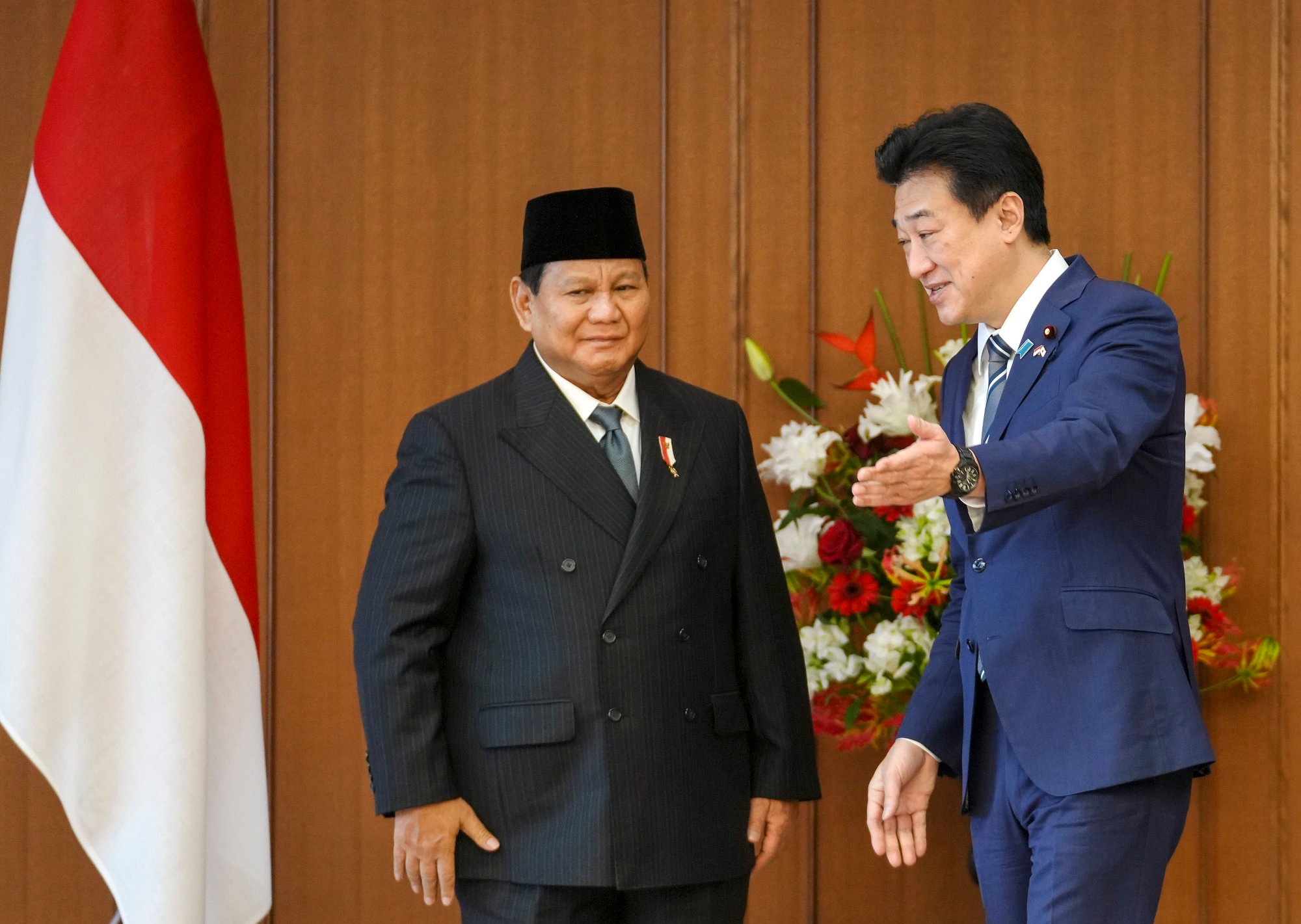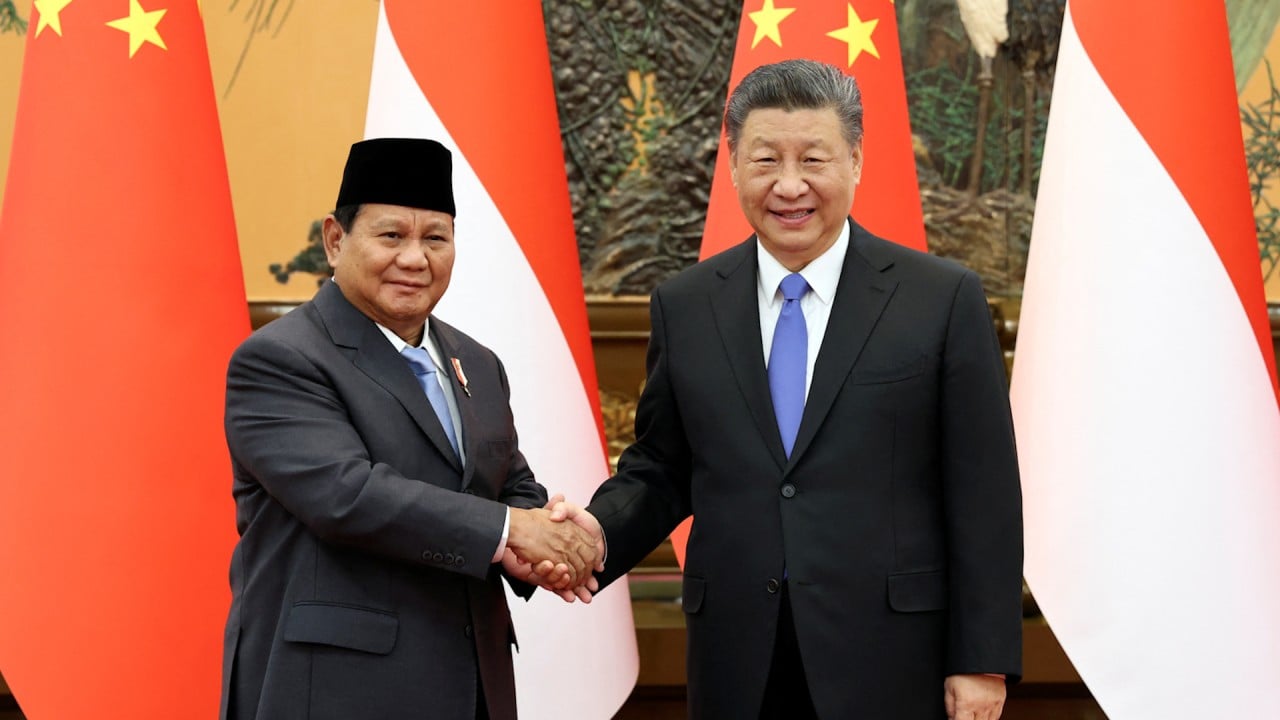
Is Indonesia’s Prabowo solidifying legitimacy with China, Japan and Malaysia visits?
- Prabowo’s visits may indicate that influential countries recognise him as the next Indonesian president and lend him more legitimacy
- The visits could also be a strong signal that Prabowo still has a good relationship with Widodo and smooth his path to office
A defence minister’s courtesy calls take on a different significance, albeit only slightly, when he will take over as Indonesia’s president in a matter of months.
Even as president-elect Prabowo Subianto’s opponents are still challenging his electoral victory, many international leaders have already congratulated him. Chinese President Xi Jinping invited Prabowo as president-elect to visit Beijing; Prabowo also visited Japan and Malaysia after that. What was the significance of Prabowo’s visits to these countries for his legitimacy as president-elect and his future foreign policy?
There were several possible explanations. First, Prabowo – who is still President Joko Widodo’s defence minister – might have wanted to show the Indonesian people that, despite the ongoing constitutional court challenge against his election win, countries that are influential nevertheless recognise him as the next president.
China, Japan visits a ‘major diplomatic coup’ for Indonesia’s Prabowo
China is a rising superpower in economy and technology, Japan is an American ally which is also economically influential in Indonesia, while Malaysia is Indonesia’s “blood brother” (saudara serumpun) that shares common interests, including strong support for Palestinians and their stance on the EU Deforestation Regulation that affects palm oil exports.
Meeting foreign leaders would allow Prabowo to show that he is already acknowledged by them as Indonesia’s president-elect and lend him more legitimacy.
Second, Prabowo probably intended to send a strong signal to domestic and international audiences that he still has a good relationship with Widodo – popularly known as Jokowi – and will continue his development policies. Prabowo might have also wanted to counter growing rumours that there is a split between him and Jokowi over the latter’s potential influence in the new administration.
Particularly for the Chinese audience, Prabowo could have wanted to promote cordial relations with Beijing so that the two countries can continue to cooperate on trade and economics. Jokowi’s foreign policy has been very friendly towards China – Prabowo would want Beijing to know he will follow in the same direction when he takes over in October.
Prabowo told Xi during their meeting that his policy would be based on what Jokowi had already accomplished.
“I am determined to use all his [Jokowi’s] achievements as a foundation for my programmes. I fully support a closer and higher quality relationship between [China] and Indonesia,” Prabowo said.
Prabowo and his Chinese counterpart, Defence Minister Dong Jun, also discussed bilateral cooperation in officers’ training and on military equipment and industry. However, no concrete details were spelled out.

Prabowo’s trip coincided with China’s seeming rising popularity in Indonesia. The ongoing war in Gaza has clearly turned Indonesians against the United States’ foreign policy actions, with ISEAS-Yusof Ishak Institute’s latest State of Southeast Asia 2024 survey showing a noticeable shift in the regional elite’s perception towards China.
When asked “If Asean were forced to align itself with one of the strategic rivals, which should it choose?”, 73.2 per cent of Indonesian respondents chose China while only 26.8 per cent preferred the US. This is a significant shift from 2023, when 53.7 per cent of Indonesian respondents selected China and 46.3 per cent chose to side with the US.
Prabowo’s visit to China would have sent a different signal had he not visited Japan thereafter. Though he was not officially invited to Tokyo, Prabowo may have wanted to show Indonesia’s non-aligned or “free and active” foreign policy by visiting US ally Japan. He met Prime Minister Fumio Kishida and Minister of Defence Minoru Kihara, and discussed economic, defence and security cooperation. The readout for this visit was slightly more specific: the Japanese promised to provide a large patrol vessel and military equipment.

Prabowo’s visit to Malaysia was possibly aimed at strengthening political support from Indonesia’s Muslim community, including those who did not vote for him in February. Malaysian Prime Minister Anwar Ibrahim welcomed him at a courtesy call; Anwar even alluded to how they both had been “tested with various challenges” before making it to the pinnacle of political power in their respective countries. Malaysia and Indonesia share strong views supporting Palestinians and have called for an end to violence in Gaza.
Looking ahead, Indonesia will strengthen its cooperation with China and Japan, and also with the US, albeit in different ways. A survey conducted from September 2022 to July 2023 by Indonesia’s National Research and Innovation Agency showed that while China had been more influential in Indonesia’s economy, the US has been more influential in Indonesia’s defence and security matters. This can be seen from Indonesia’s reliance on military equipment mainly bought from the West. The annual joint exercise between US and Indonesian military personnel under Garuda Shield is an example of cooperation that Indonesia lacks where China is concerned. Recently, Indonesia signed a US$13.9 billion agreement with the US to procure 24 new units of F-15EX fighter jets to upgrade its ageing military air fleet.
Indonesia’s Prabowo congratulated by China’s Xi, US’ Blinken over poll victory
Prabowo may rethink how best to shape Indonesia’s orientation vis-à-vis both superpowers once he assumes the presidency. After his meeting with Xi, Prabowo reportedly hoped to strengthen cooperation with China to develop military equipment and Indonesia’s weapons industry. In his speech at CSIS Jakarta during the presidential campaign, Prabowo had said that in anticipation of rising global uncertainty, Indonesia should continue its active and independent foreign policy based on its national interest.
To sum up, Prabowo’s visits to the three countries were more for solidifying his domestic legitimacy as president-elect than for his foreign policy, although the trips were not without future implications.



